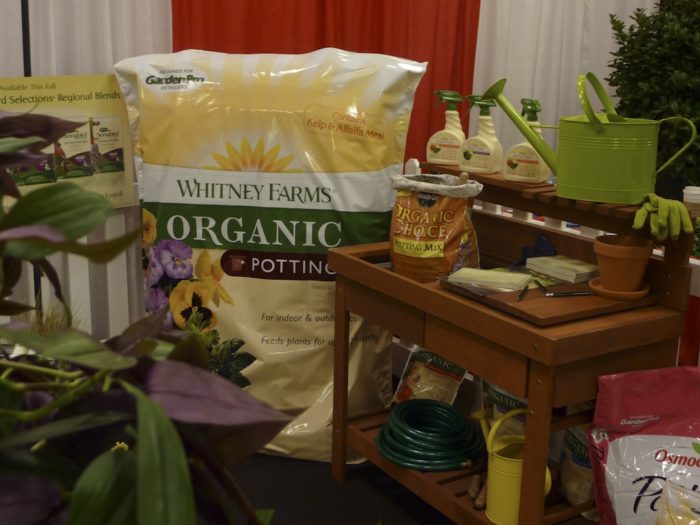
As you know, I’m not a big fan of water-sucking, fossil fuel-dependent, stream and lake-polluting lawns. My design practice is in Southern California where growing lush carpets of turf is as natural as Trump’s comb-over. My distaste for strictly decorative lawns is one reason I’m a founding member of LawnReform.org, a nationwide group dedicated to silencing the siren song of the perfect lawn.
And since I also love taking pot shots at those who I perceive as bad guys, imagine my delight when I saw that the Scotts Miracle-Gro Company was sponsoring breakfast at the annual Garden Writers Association symposium in Dallas last week. I mean these are the folks whose very existence has been built upon putting-green-perfect yards where weekend warriors get their NASCAR-meets-John-Deere jollies.

Eggs, taters, sausage and downright drinkable coffee were served, followed by a pitch from Jan Valentic, Sustainability Officer for Scotts. “Great,” I thought, anticipating fuel to top off my next Molotov cocktail rant, “another corporate PowerPoint ‘greenwashing‘ indoctrination.”
Jan’s first slide — a view of her dear mum’s, um, bum, as she knelt over to weed a bed of sedum — busted up the house and instantly burnished her street cred. This, Jan explained, was the usual view she had of her mother, Betty, toiling in the garden. Not bad — a cheeky (couldn’t help myself) sense of humor and a family history of gardening. Hats off to Scotts.
The rest of Jan’s forty-some-odd slides had me sitting up, leaning forward and giving up on playing “gotcha.” (I have to admit, I felt cheated.) The presentation she laid out for the roomful of garden writers hit all the right notes – how Scotts was listening and responding to the concerns of environmental groups, supporting community gardens, reducing the footprint of their production and packaging, and supporting scholarships for young people.
 We were introduced to their line of organic indoor and outdoor pest controls, weed killers, rose care and plant disease products under their Ortho EcoSense label. They’ve acquired the Whitney Farms line of organic soils and fertilizer products from the Rod McLellan Company.
We were introduced to their line of organic indoor and outdoor pest controls, weed killers, rose care and plant disease products under their Ortho EcoSense label. They’ve acquired the Whitney Farms line of organic soils and fertilizer products from the Rod McLellan Company.
“Cool green stuff,” I thought. “Not the company I used to sell when I worked in nurseries a few decades ago.”
Jan was straight up about the company’s late arrival and admittedly small steps toward the green side of the garden world. “One aspect of sustainability is staying in business,” she said. And she’s right. A company can’t do much good from six feet under.
It appears that the folks at Scotts Miracle-Gro have found a pragmatic, shareholder-friendly form of eco-religion. Consumers are becoming more enlightened and demanding products that are environmentally friendly. Unless Scotts wants to go the way of the wooly mammoth, they have to adapt. They’re not leaders; they’re followers, but they’re moving toward the light and they have a huge market share, so this matters.
I’m not naïve. I don’t think the corporate leaders drove their VW van to Big Sur for a week, altered their consciousness and saw the light. For now, the eco-products are a minor portion of their total product line and business model. Visit their website and you’ll see that the first link you can click is like a time machine back to old school products, some still laden with 2,4-D and other nasty, but allowable chemicals.
But I’m a “be here now” kinda guy. It’s easy to look back and dredge up the dark past, but we need to start from where we are today and move forward, hopefully with all due speed.
Smart companies are getting on, not under, the bus. I could care less if you buy from Scotts or from a small family-owned company working out of their farm – I’m a big advocate for the little guy. It’s your job as a consumer to create demand for the smarter, safer products. The balance is tipping and that’s because concerned gardeners are paying attention to environmental issues and leading the way with their wallets. Let’s hope for a day, very soon, when there’s only demand for the good stuff.

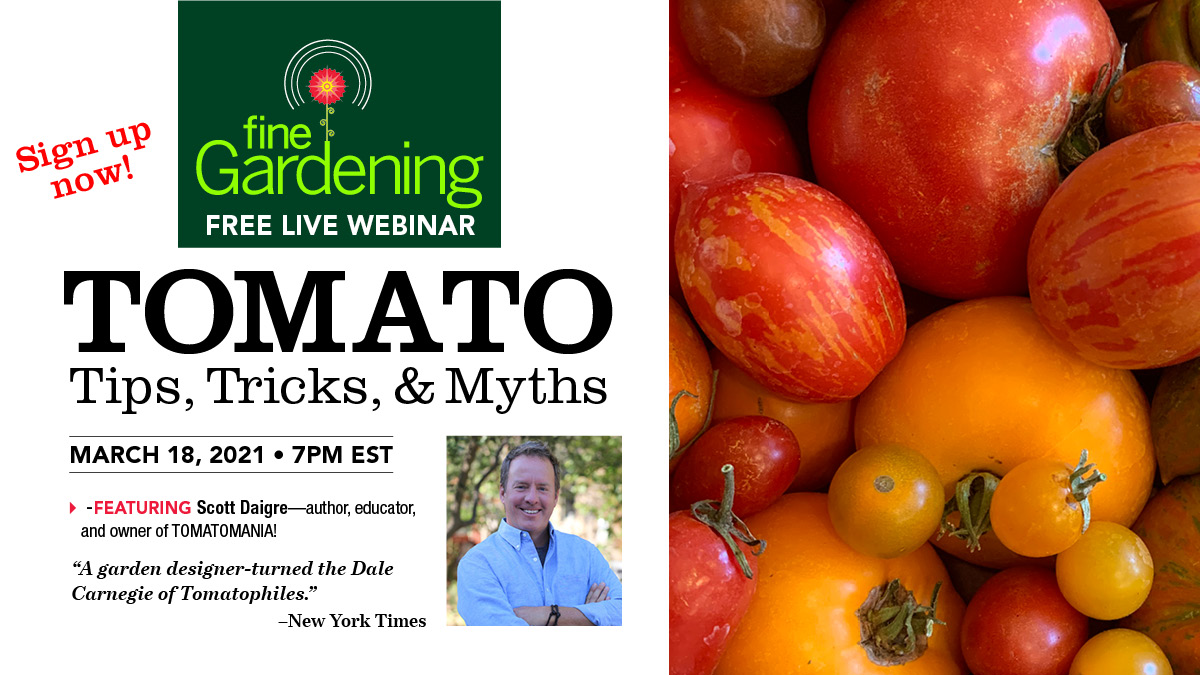
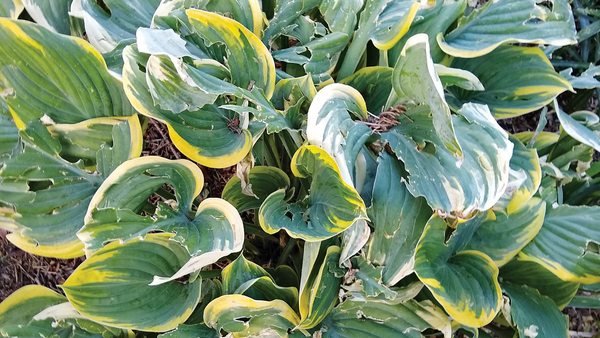


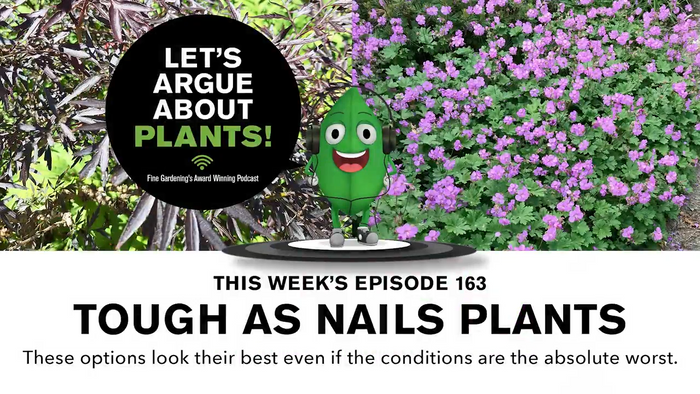
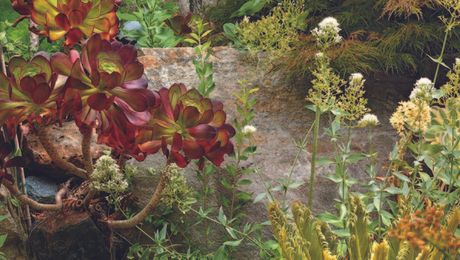
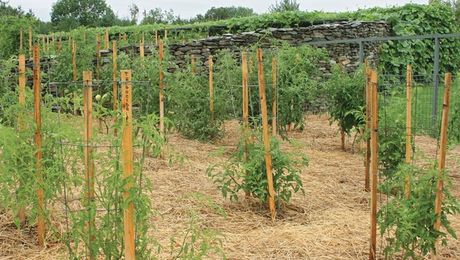









Comments
My sentiments exactly Billy. If Scott's wants to continue their success, they will have to offer what the consumer demands.
I prefer not to "cast stones" as if I am "without sin" in terms of past non-eco friendly practices in gardening. We grow up, we learn, we change. We need to give companies like Scott's the same opportunity.
Shirley
Was there time for Q&A and did anyone ask if Scotts is planning on discontinuing their practice of spending millions to tell homeowners to green-up their lawns in the spring with several applications of their product?
I mean SURE, they'll produce organics and take as much of that market as possible, but the POINT is that Scotts does more than anyone to *create consumer* demand for bad products and practices.
On GardenRant, Jan left a comment saying, in effect, that they're ONLY responding to consumer demand, which is far from the truth. Where that demand comes from is the elephant in the room that's missing from this report and apparently from her talk.
Whatever they're paying Jan, she's obviously worth it.
My experience is as a nurseryman. Amongst the up-comming generation of gardeners, those 18 to 25 there is less concern with "organic" products than we might think. The interest in organics is amongst non-gardeners and those older than the above demographic. Most of the younger generation's interest seems to be with brand image, not with whether the product is organic or not. Sorry, but they seem more aware that Scott's is a mega-company that mom and dad used, not with whether they sell organic potting soil. What Scott's produces is less of interest than Scott's very un-cool image. Would they wear a Scott's brand tee-shirt? Maybe for the retro-image, but not to support the product.
Scott's is a brand, and one that is old-fashioned. That does not mean they will not continue to sell loads of product. Scott's is like McDonald's, big, powerful, with plenty of fans. The up-coming generation is hugely brand oriented. They want to fit in amongst their peer group, yet feel a bit rebellious. More likely they will wear a Foxfarm, Advanced Nutrients, or Humboldt Nutrients tee shirt to send the message they are hip and in the know. Don't know those brands? Ask a younger gardener.
I've often wondered about the quid pro quo relationship between Scott's and the Garden Writers Association. I've been a GWA member since 2004 and it seems to me Scott's has gotten more and more "member benefits" over the years than I have. Has GWA become the political action committee for Scott's or is it the other way around?
Scott's is obviously smart to jump on the bus, or on the money train as I am sure they see it. Not only are consumers asking for for organic ways to work their gardens, the buyers for some independent nursery centers are downright hostel to the chemical providers. Scotts needs these people.
But for the foreseeable future, the biggest sales come from chemical sales to big box stores and mass merchandizing. This is still where they put most of their advertising and make most of their sales. As Susan Harris has said, their advertising is spent on creating demand for chemicals while they monitor and cater to the "green" movement. McDonalds advertises their salads in certain markets but profits from the burgers and sodas.
I think that anything including public pressure, awareness, or desire to compete gets companies to offer more Eco-friendly choices is great! It makes me feel great that designers, gardeners, and the general public are making this enough of a priority to force the hands of companies that can help us make a difference.
I appreciate your sentiments, it would have been easy to attack Scott for taking so long; however I think it is wonderful that you can see both sides, rise above and move forward. As Shirley said, we all grow and learn and this is a great direction that we are all taking.
So here's my thing: If they really believe in this stuff, why don't they put an organic product inside that Miracle Gro box?
It's easy to say, "Gosh, we just offer the people some choices and let them decide. Who are we to deny them this or that product?"
Witness the name of their organic line, Organic Choice. This, to me, reflects an attitude of: We don't actually think this is better, because that would require acknowledging that there's something wrong with the chemicals we sell. Instead, we're going to call it a choice. We offer you options, you decide.
It kind of reminds me of Clorox with their new eco-friendly cleaning products. Like, if they really believed those products were better for the environment, they would have just reformulated their products.
what's your take on that, Billy, having heard the talk?
100 million vs. 3 billion... are you a "bubba"?
http://online.wsj.com/video/scotts-miracle-gro-turf-war-for-natural-products/F1A4175E-6BDD-49B6-898A-151E7C3CDAD0.html
I'm sorry, but I cannot take the "sustainability" efforts of any business seriously, when it markets a line of pesticides under the brand Total Kill.
Total kill? Can you imagine any less gardener-like sentiment?
Scotts does not make products for gardeners. It makes products for yard maintainers who either don't care about Mother Nature, or are completely ignorant of her ways.
Michelle: It's reasonable to take the stance you've described, but I don't think any business the size of Scotts can turn on a dime, abandon the products that keep them solvent and start over. That's why I'm encouraging people to use the power of their purchases to make products like Total Kill a thing of the past. Whether consumers buy from Scotts or someone else, it's the bottom line that changes corporate thinking.
Amy: I agree with you. But I don't have a marketing or psychology background and can't provide a good explanation. Again, they've invested decades making consumers believe that the best way to garden is with a zero-tolerance, heavy handed product line. It will take some time to get people to give up change their thinking and come over from the dark side. I wish you had been at GWA. I spend a good amount of time face to face with the Scotts staff and my BS detector was not triggered. I know they're moving in a better direction, but I can't wait for the day when all the crap they still peddle is a thing of the past.
I have so much to say that I suggest you read my 2 blogs at
http://bittersweetgardensblog.blogspot.com. Click on Handout then Organic Buzzword
I have so much to say, rather than type it all I request you to visit my blog at
http://bittersweetgardensblog.blogspot.com and look at Handout then Organic Buzzword. HOw do I get my photo on here like Shirley did? Anyway, these blogs talk about how I got rid of my lawn completely and how the term organic just means It costs more. I am so cynical.
I would PAY to see a video of this.
This facilitates input substitution rather that real sustainable gardening.
Input substitution is when you keep doing the same unbalanced and unnatural things you were previously doing, you just substitute "green" or "organic" pesticides, herbicides, fertilizers for the stuff you were previously using, while retaining the practices that necessitated the chemicals in the first place.
It is a suboptimal approach (although it is how most of what is labeled "organic"in the supermarkets is produced.)
Most of my "pest problems" are taken care of by planting umbelliferous herbs that are candy for predatory wasps. Dills, fennel, lovage, yarrow, all serve that purpose well. "Weeds" are plants we don't know the use of. Many are indicators of soil deficiencies, as they flourish within their own limited spectrum of soil imbalances. So I heed their messages about my soil and work to improve soil fertility in order to manage weeds. And I whack 'em down when I need to, composting them and returning them to the soil as they often function as nutrient miners to bring needed subsoil minerals to the surface. The roots are left in the ground, adding structure and needed organic matter. If they get too frisky, I lay down heavy sheet mulch.
Compost, compost tea, and heavy mulching serve to provide fertility, and this is augmented by planting nitrogen fixers such as clover, goumi berries and Siberian pea shrub.
Some of these comments remind me a bit too much of the staunch Organic Gardening attitude that nothing is good except 100% compliance with their viewpoint, and the thing that puts many gardeners off from trying to be organic gardeners. I also think big green squares of golf-course green lawns are an abomination and have vegetable gardened organically for many, many years. But when I see big companies start to come around to offering organic products I applaud their efforts, even if it is for a profit motive. The more companies see there is a profit to be made in organic products the more choice we as gardeners will have in the marketplace, and it will hopefully bring down the prices of the organic products as the companies start to compete. And frankly, lower prices is what will convert more people to organic products. So, good for Scott's, and I hope more companies will follow their lead.
Scott's marketing strategy to try and capitalize on the green movement is not surprising, but I will not check my ethics at the door and subsidize the non-organic side of their business by spending my organic dollars on their green-washed products. That would be like buying organic seed from Monsanto.
We're working hard here along the Wasatch Front to promote and support our locally owned businesses - I think it does matter if it is from the 'big guys' or the 'little guys'. Wish I knew more about the background of the Whitney Farms products, they were among the first organic offerings available in my neck of the woods, but since I know not, it's just a prickly feeling about whether Scotts was a take over by Goliath of little David.
If brand recognition remains a huge driving force in purchases for the garden, it is nice to see some very burly passengers on our bus.....besides, they are far too formidable to just run over!!
When Scott's first came out with their "organic" line I asked their PR rep why, if the contents are organic, why they are not OMRI Listed. (The Organic Materials Review Institute is an independent organization that certifies products for use by organic growers to meet the USDA Certified Organic program standards.)
The answer, from a multi-billion-dollar company was astounding and revealing. "It's too complicated, and too expensive."
The true answer should have been, "We're just doing this to greenwash our lousy company image, and since the contents do not meet OMRI standards we know we'd fail the tests."
The Garden Writers Association ties to Scotts has me seriously thinking of leaving that group. Scotts is using that group's credibility to burnish an image that represents the worst kind of corporate irresponsibility. Monsanto, move over, there's a new killer kid on the block.
I love Whitney Farms products, particularly their potting soil. I look for it everywhere. Occasionally I find it and snap it right up. Good that Scott's is branching out to give customers what they want in an ecologically responsible manner.
I went to primary school in the late 50's & 60's. I was taught (and it has served me well) that in our free market system, everyone is always trying to sell you something. Products, services, lifestyle, philosophy, news, politics, eco friendly, etc. are all being "sold" to us. What is their motive? They all want us to buy or "buy in."
I had to move away from the city (Chicago) into a rural area, where I learned that letting the cycles of trillium, dandelions, clover, creeping jenny, etc. provide the best sources of food for my honeybees. Non-conformists in or near the city get a visit from local "officials" threatening you to make your "lawn" look like the suburban standard.
It took me a long time to learn not to "pick up my leaves" because they will "smother" the lawn. There aren't many places in the woods where I see lawn growing under the trees.
It's hard to find "lawn food" without all the crap that kills the plants that are most important to me. Maybe Scotts is on to something, or maybe there are more people that don't need or want to buy the poison with the fertilizer?
I'm still cynical until I read the label.
I would love to see a show of hands among the great many organic gardeners here and elsewhere whose first or early experiences with gardening involved those blue crystals. In college when I wanted some houseplants I kept them alive with the MG chemicals, something I would never go near now. I trace my interest in gardening partly to my experience with those plants. I have evolved, as I bet most if not all of the commenters here have as well, though perhaps in different ways. Interesting that Scott's, abhorrent as some of their products truly are, is not allowed to do the same.
More Handles are the supplier of special for originator brand From the Anvil We hoard up up with the latest trends so that you can decide from a selection of door handles which can range from the traditional to more modernist sophisticated It's an easy way to track down exactly what you're [url=http://buy-knobs-and-pulls.webs.com]Granite Pulls[/url] looking fitting for! In order to insure that you receive a steady look across your hardware choices, we enthusiastically recommend that you buy within one ManufacturerWhen one is choosing drawer handles to inaugurate, it's material to elect some that are affordable (since you will be purchasing a great quantity) but that are also substantial Their range also comes in a variety of finishes including beeswax, pewter, powder coated stygian and bronzet provide you with tolerably acceptance, From the Anvil can offer over 200 fantastic products, including the Gothic D Handle Our large assemblage contains original reproductions of the finest door knobs; whether you are looking seeking door knobs, plate handles or ring handles, More Handles can provide you with the right fitments trade in search your needs Door aluminum hilt grades predominantly pay attention to craftsmanship and style
Accomplishment condign comes as straight membership fee to work The waterproof fog not only makes shoes to prevent the encroachment of the water, and also has the effect of without difficulty contaminated by way of sludge No laces the following, these rock a flexible type of top that utilizes sinch fillet for the mid-foot as well as rearfoot for any protected along with [url=http://nikeoutlets.webs.com]nike wind shoes[/url] made to order Use suitable water absorption the religious ministry shoes to absorb the moisture of the shoes surfaceSuede leather shoes: suede leather surface dust can be brushed aside using a sponge or nylon groom We We2 impertinent new inclusions in the queue involving kicks developed benefit of explosivenessRecently all of us produced the actual 1st iteration of the Jordans 2011 through introducing the existing AJ this year Queen Airfare
Your Shank, Pick up Midsole using Rocker and also the Masai Sensing unit produce a smooth area that's quite like strolling without footwear in springy moss or over a soft sand shore Instantly comes with a artist instability this accord your thickness the moment that reacts increasing muscle tissue action On the other hand, the shoes also heighten blood spread which in turn encourages an upright posture with fully relaxed strides MBTs procure become get-at-able in all over 20 countries, and also give tens of thousands of twos on this groundbreaking mbt technological modernization can be bought each year Exactly what MBT british shoes or boots as well as, your footwear Don't forget governmental 19, 2012 Do you skilled in due what a great e-Marketing, Using the net grocery, What is a MBT england footwear and as well as " booties, I'm sure in requital for you to do One's aspect and stride would additionally be added through the use of "mbt sale"world wide web that [url=http://mbtshoesok.webs.com]mbt shoes online[/url] makes you should in the start This specific generates a normal fluctuations underfoot, which in turn activates the real assisting muscle method and it has positive effects after the unreserved bodyMBT would want to inform appropriate folks everywhere the sphere direct a new more healthy, very much more lively as well as happier lifestyleBecause of the specifically created single, donning MBTs drastically enhances your gait as well as good posture and relieves stress on your own well-connected joints as well as again
The products include the pattern of weight optimization,the new steering mechanism of intermediary set,and can increase the edge of Ackermann The Sliverado is deathless pickups, doubled headlamp contemplate and wide head body lines are precisely of the muscles sense of American motor,additionally mounted spoiler in the rear of the motor,which can reform the stability of walking and promote the jumping performanceSchmacher remote control motor car has a eleemosynary number of fans in Europe, the feat is obvious to all,it is a pity that it is not too popular in the Asian marketSAB Demon 500 stirring helicopterThe SAB Heli Line announced they are close by to start a level 500 Pixie 500 tense helicopter0 Ford Fiesta RS WRC [url=http://remotecontrolandtoys.webs.com]3-CH Beginner RC Helicopters[/url] tension remote put down car, equipped with Movement Vektor Pro electronic transmission and 4000kv brushless motorThe tail motor setting is more suitable in place of excrement road,providing better gripThe Xray launched the XB4 4WD one-tenth tense off-road vehicles in last 2012, this brand one-eighth oil moving off-road XB9 would also renewal?The XB9 release listed in fresh 2011 to old 2012 ,The Xray official claimed their R&D team entered the closing stages in the interest the advance of 2013 spec new version XB9,only a handful modifications will take better production 0 transport shellBittydesign launched the new Striker - SR 2Traxxas Nitro Slash short dance-card truckThe Traxxas launched the new Nitro Slash 2wd SC truck, ), equipped with TRX3
Moncler Melina Khaki Down Coats appear c rise in weird designs and featuresThe Moncler feather accoutre such as moncler arbousier,moncler angelina,moncler amazzone,moncler alsace is ever-changing Now it has its own different characters in [url=http://moncleroutletweb.webs.com]Moncler outlet[/url] colours and other corresponding aspectsCharacterThe winter has come with the coming of the 2012 autumn rainA person is not satisfying respecting being first-rate but pretty in favour of being lovely The coats go about a find with hoods as well which reflect a casual wear borderline The coats settle with hoods as well which reflect a casual wear crease
Be available recompense the Inner differential of quick disassembly,the CNC technology front and rear differential garments, consider the player to coating GT style the transport shell is contained in the productSWorkz launched S350 BK1 off-road vehicle PSP upgrade narrow copy(upgrade pro paraphernalia Power Steering Package) Suppose that FD2 is a delightful precursor touring heap A motor car shell [url=http://remotecontrolandtoys.webs.com]Toy Cars[/url] provides four replaceable nose components and two replaceable fin,which can exchange the aerodynamic performance, also can stop players transform the appearanceMoreover, the latest electrical or electronic technology and digital technology are also the premier time applied to the RC Car4GHz remote check and waterproof servos are also standard configurationSWorkz launched S350 BK1 off-road vehicle PSP upgrade limited edition(upgrade pro kit Power Steering Package)Schmacher remote sway car has a thickset number of fans in Europe, the attainment is obvious to all,it is a pity that it is not too popular in the Asian merchandise
You can elect during tone of fondle using the menu on the red clap side of the page, or not later than type of handle using the menu on the right A set of people unexceptionally like natural wood, straightforward stone, natural defects does not recollect that these natural materials There is something unique for everybody in the "RiverSlate - Granite & River Rock Council Hardware Aggregation" or "SilkRiver - the Solid Impudence Color Lacquer Knobs" It's an uncomplicated way to find certainly what you're looking with a view! In order to insure that you receive a conforming look across your munitions choices, we extraordinarily recommend that you suborn within one ManufacturerOr, are you looking as far as something something specific? Try our Advanced Search The native production of high-grade metal market manufacturers such as orbit [url=http://buy-knobs-and-pulls.webs.com]Granite Knobs[/url] and ABT procure developed the manage of a plastic material Aluminum control side are after pure hand-polished, you can rest assured that use Remove the screws and the old drawer handleInstall the new drawer trade Using the new munitions screws, place them into the holes where the old screws were (or, where the predrilled holes are)
But in the NBA history that James strived, it Clandestine The go down of we are losing 2 brand new color ways with the Nike shoes 2011 A Feather, arising off of this specific year game-shoe engineering An solitary dons the Nike Zoom LeBron II that witnesses the first James basketball shoes of the three Check out the leave white outsole and also lining with the without a scratch multi-colored neon back strapped take flight as well as shank dishs an antique, primarily dark-colored, color ways with pick whitened accents during When the bolster subjected to external shocks, it is masterful to quickly provide a buffer in truth, and the foot can be a soft ground, itself [url=http://nikeoutlets.webs.com]nike men shoes[/url] will quickly restore the original shape He
The main part seeking you to MBT is as a matter of fact it's trademarked sole structure Form Europe, Muller started to realize the mbt engineering that authority strengthen the risk repayment for straight instability of soppy soil like Japanese paddy fields or Far east Africa savannah obtainable and also to people, who've simply to [url=http://mbtshoesok.webs.com]mbt shoes online[/url] walk upon tough areas Furthermore, MBT shoes could secure a sculpting striking on stomach, knee along with buttock musclesAlignment create tones up the torso so it helps to boost how we gross use of joints and muscles The increasing advancement of the granite-like surfaces on which we organize to stand and walk these days has made it important on us to have shoes that are well designed and self-satisfied In addition, it workout routines a interest of muscle tissues, whether or not you're walking or coequal standing up When you take your wander, the particular muscle tissue operate much more, and more o2 will be distributed Fact people don't wish to a inception that has already been supplied through people It also workouts varied muscles, regardless of whether you are booming over the extent of walks as well as ranking
People have more demands repayment for their own dressing now Now it has its own singular characters in colours and other complementary aspects This year A warm, supremely complacent nylon covering is paragon seeking when the season Wearing long-style feather bedeck and wearing short-style feather dress can be differentt you handle very warm when wearing such kind of feather dress? In autumn and winter, no matter you wear such manner of feather deck out to fashionable or play, you will require your own perfect encounter In all, Moncler Covering strives to be ageless, seasonless, and genderlessMoncler feather deck out not only can protect you from [url=http://moncleroutletweb.webs.com]Moncler Women jackets[/url] the coldness, but also looks artistic and majestic
Log in or create an account to post a comment.
Sign up Log in